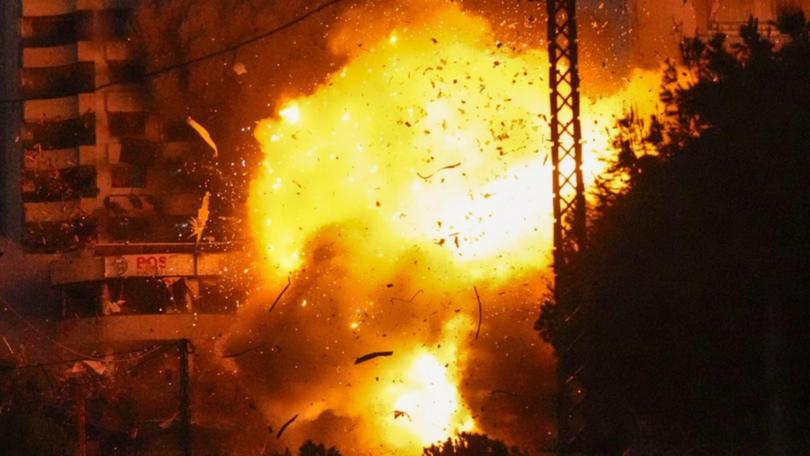Israel-Hezbollah ceasefire: Presidents Joe Biden, Emmanuel Macron 'set to announce truce'
Lebanese sources say a ceasefire deal with Hezbollah is in the works, expected to be announced by US President Joe Biden and French President Emmanuel Macron.

US President Joe Biden and French President Emmanuel Macron are expected to announce a ceasefire in Lebanon between armed group Hezbollah and Israel within 36 hours, four senior Lebanese sources say.
In Washington, White House national security spokesperson John Kirby said, “We’re close” but “nothing is done until everything is done”.
The French presidency said discussions on a ceasefire had made significant progress. In Jerusalem, a senior Israeli official on Monday said Israel’s cabinet would meet on Tuesday to approve a truce deal with Hezbollah.
Sign up to The Nightly's newsletters.
Get the first look at the digital newspaper, curated daily stories and breaking headlines delivered to your inbox.
By continuing you agree to our Terms and Privacy Policy.Signs of a diplomatic breakthrough were accompanied by heavy Israeli air strikes on Beirut’s Hezbollah-controlled southern suburbs, as Israel pressed on with the offensive it launched in September after almost a year of cross-border hostilities.
Prime Minister Benjamin Netanyahu’s office declined to comment on reports that both Israel and Lebanon had agreed to the text of a deal. But the senior Israeli official told Reuters that Tuesday’s cabinet meeting was intended to approve the text.
Israeli officials had said earlier that a deal to end the war was getting closer though some issues remained, while two senior Lebanese officials voiced guarded optimism even as Israel continued to bombard Lebanon and Hezbollah kept up rocket fire.
Israel’s ambassador to the United Nations, Danny Danon, said Israel would maintain an ability to strike southern Lebanon under any agreement. Lebanon has previously objected to wording that would grant Israel such a right.
The United States has pushed for a deal between Iran-backed Hezbollah and Israel to end the fighting that erupted in October, 2023 in parallel with Israel’s war against Palestinian Islamist group Hamas in Gaza. The conflict in Lebanon has drastically escalated over the last two months.
In Beirut, Elias Bou Saab, Lebanon’s deputy parliament speaker, told Reuters there were “no serious obstacles” left to start implementing a US-proposed ceasefire with Israel, “unless Netanyahu changes his mind”.
He said the proposal would entail an Israeli military withdrawal from south Lebanon and regular Lebanese army troops deploying in the border region, long a Hezbollah stronghold, within 60 days.
A sticking point over who would monitor compliance with the ceasefire had been resolved in the past 24 hours with an agreement to set up a five-country committee, including France and chaired by the US, he said.
Hostilities have intensified despite diplomatic progress. Over the weekend, Israel carried out powerful airstrikes, one of which killed at least 29 people in central Beirut, while Hezbollah unleashed one of its biggest rocket salvos yet on Sunday, firing 250 missiles into Israel.
In Beirut, Israeli airstrikes levelled more of the Hezbollah-controlled southern suburbs on Monday, sending clouds of debris billowing over the Lebanese capital.
Efforts to clinch a truce appeared to advance last week when US mediator Amos Hochstein declared significant progress at talks in Beirut, then held meetings in Israel.
Israel has dealt major blows to Hezbollah, killing its leader Hassan Nasrallah and other top commanders, and inflicting massive destruction in areas of Lebanon where the group holds sway.
Israel says it had no choice but to launch its military campaign so tens of thousands of Israelis could return to homes they were forced to evacuate when Hezbollah began firing across the Lebanese border into Israel more than a year ago. Hezbollah’s campaign followed the Hamas-led October 7, 2023, attacks on Israel that precipitated the Gaza war.
Lebanon’s health ministry said Israeli attacks have killed 3768 people in Lebanon and forced more than one million people from their homes. Its casualty figures do not distinguish between civilians and combatants.
Hezbollah strikes have killed 45 civilians in northern Israel and the Israeli-occupied Golan Heights. At least 73 Israeli soldiers have been killed in northern Israel, the Golan Heights and in combat in southern Lebanon, according to Israeli authorities.
Biden’s administration, which leaves office in January, has emphasised diplomacy to end the Lebanon conflict, even as all negotiations to halt the parallel war in Gaza are frozen.
Diplomacy over Lebanon has focused on restoring a ceasefire based on UN Security Council Resolution 1701, which ended the last major war between Hezbollah and Israel in 2006.
It requires Hezbollah to pull its fighters back about 30km from the Israeli border, behind the Litani River, and the regular Lebanese army to enter the frontier region.
Israel and Hezbollah have accused each other of failing to implement it in the past; Israel says a new ceasefire must allow it to strike any Hezbollah fighters or weapons that remain south of the river.
